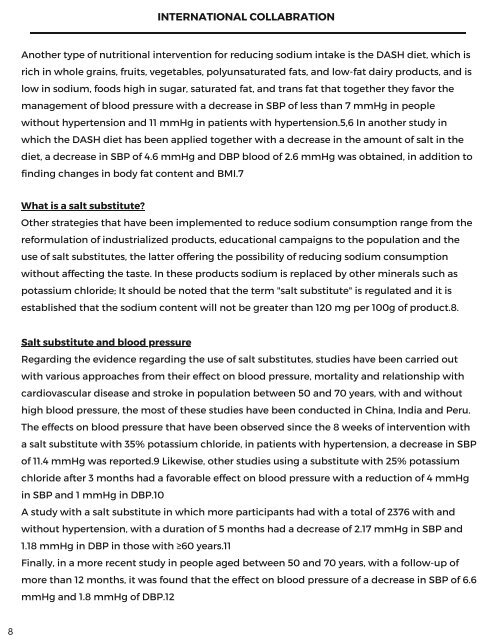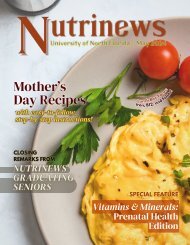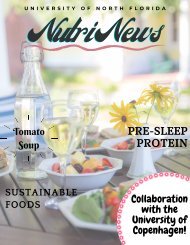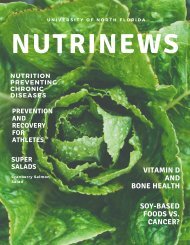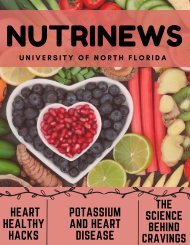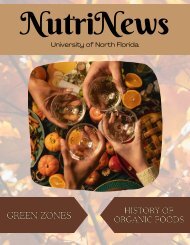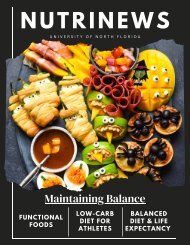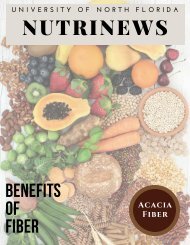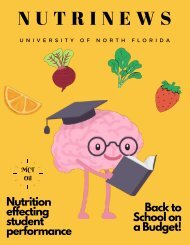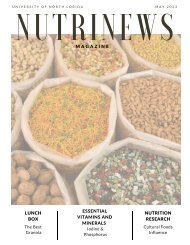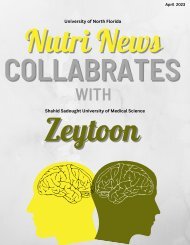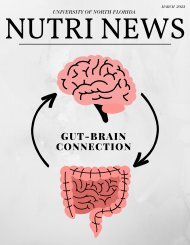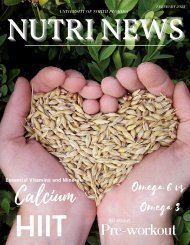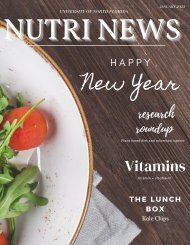Nutri News December 2022
This month theme is the colors of health!! You will find articles about: • The importance of a colorful diet “Eat the Rainbow” • How is biotechnology is affecting our foods • What is intuitive eating and how it can help you recognize and be more sensitive to your body’s hunger and satiety signals • Delicious and colorful vegan recipes in the lunch box! • What’s the hype behind Phytochemicals, are they really that important? Let me answer that for you, YESSS!! • Have you seen those foods that claim to be gluten “free” and have wonder what gluten is and if you should care whether your food is gluten free, check our myth busting article to find out more • The holidays are coming and with that all the delicious foods we like to indulge on, but beware “SALT” check out our international collaboration about salt and salt substitutes • “Ditch the dietary supplements and eat whole foods instead” What are the effects of supplement vs whole foods in sports performance • Have you been feeling tired and down recently? you might have a vitamin D deficiency, check out our essential guide to vitamins and minerals article to learn more about the role of magnesium and vitamin D in our mood, sleep, and overall health This month’s student spotlight is Lindsey Cedeno Ortiz, check what she has to say in page 12! For this month interview, we have Dr. Catherine Christie, recipient of the Academy of Nutrition and Dietetics Medallion Award. This is an interview you won’t want to miss!!!! If you are looking to make an impact on campus as well as in the community, look for the fliers highlighting volunteer opportunities. These amazing programs are always looking for more volunteers. It is amazing the difference we can make when we all work together for a better and healthier tomorrow. Happy reading!
This month theme is the colors of health!!
You will find articles about:
• The importance of a colorful diet “Eat the Rainbow”
• How is biotechnology is affecting our foods
• What is intuitive eating and how it can help you recognize and be more sensitive to your body’s hunger and satiety signals
• Delicious and colorful vegan recipes in the lunch box!
• What’s the hype behind Phytochemicals, are they really that important? Let me answer that for you, YESSS!!
• Have you seen those foods that claim to be gluten “free” and have wonder what gluten is and if you should care whether your food is gluten free, check our myth busting article to find out more
• The holidays are coming and with that all the delicious foods we like to indulge on, but beware “SALT” check out our international collaboration about salt and salt substitutes
• “Ditch the dietary supplements and eat whole foods instead” What are the effects of supplement vs whole foods in sports performance
• Have you been feeling tired and down recently? you might have a vitamin D deficiency, check out our essential guide to vitamins and minerals article to learn more about the role of magnesium and vitamin D in our mood, sleep, and overall health
This month’s student spotlight is Lindsey Cedeno Ortiz, check what she has to say in page 12!
For this month interview, we have Dr. Catherine Christie, recipient of the Academy of Nutrition and Dietetics Medallion Award. This is an interview you won’t want to miss!!!!
If you are looking to make an impact on campus as well as in the community, look for the fliers highlighting volunteer opportunities. These amazing programs are always looking for more volunteers. It is amazing the difference we can make when we all work together for a better and healthier tomorrow.
Happy reading!
You also want an ePaper? Increase the reach of your titles
YUMPU automatically turns print PDFs into web optimized ePapers that Google loves.
INTERNATIONAL COLLABRATION<br />
Another type of nutritional intervention for reducing sodium intake is the DASH diet, which is<br />
rich in whole grains, fruits, vegetables, polyunsaturated fats, and low-fat dairy products, and is<br />
low in sodium, foods high in sugar, saturated fat, and trans fat that together they favor the<br />
management of blood pressure with a decrease in SBP of less than 7 mmHg in people<br />
without hypertension and 11 mmHg in patients with hypertension.5,6 In another study in<br />
which the DASH diet has been applied together with a decrease in the amount of salt in the<br />
diet, a decrease in SBP of 4.6 mmHg and DBP blood of 2.6 mmHg was obtained, in addition to<br />
finding changes in body fat content and BMI.7<br />
What is a salt substitute?<br />
Other strategies that have been implemented to reduce sodium consumption range from the<br />
reformulation of industrialized products, educational campaigns to the population and the<br />
use of salt substitutes, the latter offering the possibility of reducing sodium consumption<br />
without affecting the taste. In these products sodium is replaced by other minerals such as<br />
potassium chloride; It should be noted that the term "salt substitute" is regulated and it is<br />
established that the sodium content will not be greater than 120 mg per 100g of product.8.<br />
Salt substitute and blood pressure<br />
Regarding the evidence regarding the use of salt substitutes, studies have been carried out<br />
with various approaches from their effect on blood pressure, mortality and relationship with<br />
cardiovascular disease and stroke in population between 50 and 70 years, with and without<br />
high blood pressure, the most of these studies have been conducted in China, India and Peru.<br />
The effects on blood pressure that have been observed since the 8 weeks of intervention with<br />
a salt substitute with 35% potassium chloride, in patients with hypertension, a decrease in SBP<br />
of 11.4 mmHg was reported.9 Likewise, other studies using a substitute with 25% potassium<br />
chloride after 3 months had a favorable effect on blood pressure with a reduction of 4 mmHg<br />
in SBP and 1 mmHg in DBP.10<br />
A study with a salt substitute in which more participants had with a total of 2376 with and<br />
without hypertension, with a duration of 5 months had a decrease of 2.17 mmHg in SBP and<br />
1.18 mmHg in DBP in those with ≥60 years.11<br />
Finally, in a more recent study in people aged between 50 and 70 years, with a follow-up of<br />
more than 12 months, it was found that the effect on blood pressure of a decrease in SBP of 6.6<br />
mmHg and 1.8 mmHg of DBP.12<br />
8


